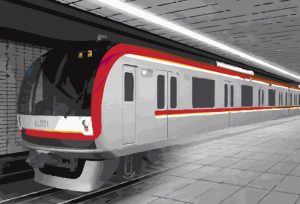
P56-billion subway loan to be approved in March
By Luisa Maria Jacinta C. Jocson, Reporter
A LOAN DEAL worth around P56 billion, which represents the third tranche of funding for the Metro Manila Subway project, is expected to be approved next month, according to the Department of Finance (DoF).
“For our part, the DoF is fully committed to securing the funding for this project. We aim to finalize the loan agreement for the third tranche of financing by March 2024,” Finance Secretary Ralph G. Recto said during a press briefing on Monday.
The latest loan is worth around P55.7 billion (¥150 billion), and will be funded by the Japan International Cooperation Agency (JICA).
The loan agreement for the first tranche worth around P38.8 billion (¥104.5 billion) was signed in 2018, while the deal for the second tranche worth P94.1 billion (¥253.3 billion) was inked in 2022.
The loan deals for the fourth and fifth tranches, with a combined estimate of P151.1 billion (¥406.6 billion), are still under discussion.
Data from the DoF showed that each loan has a maturity period of 40 years. This includes a 12-year and 13-year grace period for the first and second tranches, respectively.
The project, which would mark the country’s first-ever subway system, is currently at a 40% overall accomplishment rate, according to the Transportation department.
The 33-kilometer subway will have 17 stations from Valenzuela to Bicutan with a spur line to Terminal 3 of the Ninoy Aquino International Airport (NAIA). It is expected to be fully completed by 2029.
“We hope that we should be able to dig and operate additional tunnel-boring machines. Right now, there are (five) tunnel-boring machines, and we’re expecting to have more within the year,” Transportation Secretary Jaime J. Bautista said at the same briefing.
Meanwhile, the Department of Transportation (DoTr) said that the awarding of the three remaining contract packages for the project will be delayed to the third quarter from initially the first quarter.
These include contract package 105 for the Kalayaan Avenue and Bonifacio Global City underground stations, contract package 108 for the Lawton and Senate-DepEd stations, and contract package 109 for the Terminal 3 station.
Mr. Bautista said that the department is also in the process of procuring for the operations and maintenance (O&M) for the Metro Manila Subway, Metro Rail Transit Line 3 (MRT-3) and North-South Commuter Railway.
“We’re working with a transaction advisor so that they can advise us on the parameters, terms and conditions… so we’re still working on this. Hopefully, we should be able to have something before the end of the year,” he added.
The subway is expected to cut travel time from Valenzuela to NAIA to 35 minutes from one hour and 30 minutes. It is expected to benefit 519,000 commuters everyday.
“The construction of this massive project has already generated 5,469 jobs for both skilled and unskilled. This will provide a vital boost to our labor market. It is estimated that more than 5,500 workers will benefit from employment opportunities once the subway fully operates in 2029,” Mr. Recto said.
An earlier study by JICA showed that traffic congestion in Metro Manila alone cost the economy at least P3.5 billion per day in losses. Without effective intervention, this would increase to P5.4 billion daily by 2035.
“The Metro Manila Subway’s direct economic benefits will allow us to save about P2.5 billion daily or P930.26 billion annually through reduced vehicle costs, travel time, and carbon emissions,” Mr. Recto said.



